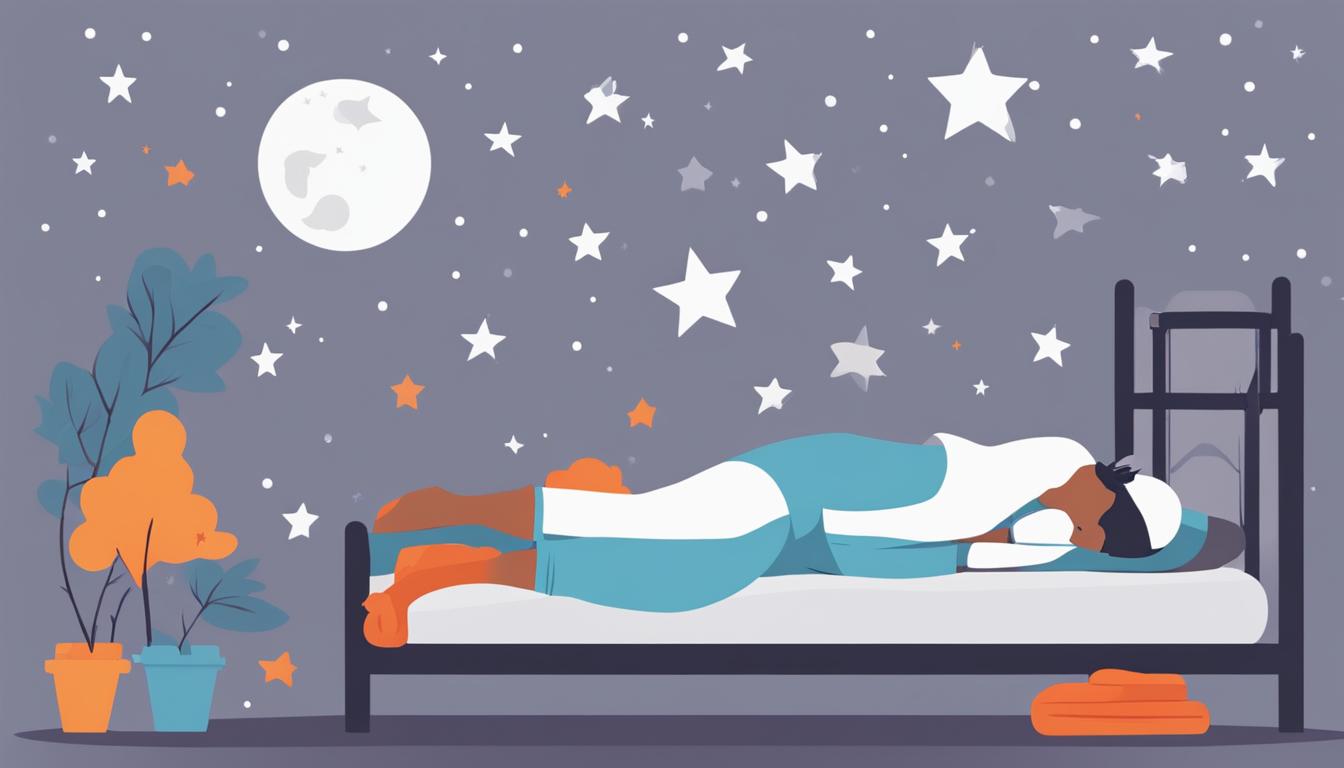Your health and wellbeing are influenced by various factors, and two of the most important ones are fitness and sleep. Maintaining a healthy lifestyle that incorporates regular exercise and quality sleep can have numerous benefits for your overall health and vitality. In this article, we will explore the relationship between fitness and sleep, the impact they have on each other, and provide tips on how to improve sleep quality and maximize the health benefits of both.
Fitness and sleep are essential components of a healthy life. By prioritizing exercise and restful nights, you can experience improved physical and mental well-being. Exercise not only helps you stay fit and maintain a healthy weight but also plays a crucial role in promoting healthy sleep. Quality sleep, on the other hand, enhances athletic performance, facilitates muscle recovery, and aids in weight management.
Key Takeaways:
- Regular exercise and quality sleep are crucial for overall health and wellbeing.
- Exercise can improve sleep quality, while sleep enhances athletic performance.
- Include both aerobic and resistance exercises in your fitness routine for better sleep.
- Practice good sleep hygiene, such as setting a regular sleep schedule and creating a sleep-friendly environment.
- Consult with healthcare professionals for personalized recommendations on fitness and sleep.
The Relationship Between Diet, Exercise, and Sleep
Diet, exercise, and sleep are interconnected and influence each other in various ways. Research has shown that a healthy, balanced diet can reduce the risk of numerous health conditions and even affect mental health. What you eat can impact sleep quality and duration, with caffeine and late-night eating being known disruptors. Similarly, exercise is essential for overall health and can improve sleep quality.
“Both aerobic and resistance exercises have been found to enhance sleep, reduce sleep problems, and lower pre-sleep anxiety”, says Dr. Sarah Johnson, a leading sleep researcher. “Engaging in regular exercise can help regulate your sleep-wake cycle and promote better sleep.”
When it comes to diet, it’s important to focus on consuming an adequate amount of fluids, carbohydrates, and protein. These nutrients fuel your body and support athletic performance, while also providing the necessary building blocks for muscle recovery. On the other hand, a high-calorie diet or nutrient deficiencies can contribute to sleep disruptions and impact overall health.
“Achieving a balance between exercise, diet, and sleep is crucial for your health and wellbeing,” advises nutritionist Emily Roberts. “By maintaining a balanced diet, avoiding late-night eating, and engaging in regular exercise, you can promote good sleep and optimize your overall wellbeing.”
Consider incorporating workout and diet routine tips from experts like Emily Roberts to ensure you’re providing your body with the necessary fuel for both exercise and sleep. Remember to listen to your body and make adjustments as needed to achieve a healthy balance.

The Benefits of Exercise for Better Sleep
Exercise offers numerous benefits for better sleep. Both aerobic exercise, such as cardio and running, and resistance exercise, like weightlifting, have been shown to improve sleep quality. Engaging in any amount of movement can improve sleep, although the optimal amount may vary depending on age.
The timing of exercise also matters when it comes to sleep. Exercising in the morning or afternoon can benefit sleep, while exercising too close to bedtime can make it difficult to fall asleep due to the chemicals produced by physical activity. Exercise helps regulate the body’s circadian rhythm and can induce sleepiness by increasing adenosine levels in the brain.
Finding the right exercise routine and timing can contribute to better sleep and overall health. By incorporating regular physical activity into your daily routine, you can experience sleep-inducing exhaustion and enhance the chemical effect on the brain that promotes restful nights. Additionally, aligning your exercise routine with your sleep cycle can further optimize sleep quality.
Incorporating exercise into your lifestyle can lead to improved sleep quality, reduced sleep problems, and better overall sleep hygiene. Whether it’s a morning jog or an evening weightlifting session, exercise has a profound impact on sleep. So lace up your sneakers, find the exercise that suits you best, and get ready for a night of rejuvenating sleep.
The Impact of Sleep on Fitness and Health
Sleep duration and quality play a critical role in maintaining optimal fitness and overall health. Unfortunately, a significant portion of the population fails to meet the recommended seven hours of sleep per night. Sleep deprivation poses various health risks, including an increased likelihood of developing chronic conditions such as diabetes, heart disease, and stroke.
Sleep deprivation can also affect our dietary choices and eating behaviors. When we don’t get enough sleep, we are more likely to overeat and make unhealthy food choices. This can have a detrimental effect on weight management and contribute to obesity.
Furthermore, sleep is essential for muscle recovery and providing energy for exercise. When we sleep, our body repairs and rebuilds damaged muscle tissue, allowing us to perform at our best during physical activity. Conversely, sleep deprivation can impair cognitive functions, including concentration and decision-making abilities, increasing the risk of accidents during exercise.
Hormones such as ghrelin and leptin, which regulate appetite, are also influenced by sleep deprivation. Ghrelin, known as the “hunger hormone,” increases hunger and stimulates appetite, while leptin, known as the “satiety hormone,” reduces appetite. Lack of sleep disrupts the balance between these hormones, leading to increased food cravings and potentially contributing to obesity.
To prioritize both fitness and health, it’s crucial to prioritize and prioritize sufficient sleep. Aim for at least seven hours of sleep per night to promote muscle recovery, provide energy for exercise, and support optimal cognitive functions. By prioritizing sleep and ensuring you get enough restful nights, you can enhance your overall wellbeing and make progress towards a healthier lifestyle.

Finding the Right Balance
While prioritizing diet, exercise, and sleep is essential for overall health and wellbeing, it can be challenging to balance all three factors in our busy lives. That’s why personalized recommendations from healthcare professionals, such as nutritionists, dieticians, physical therapists, and sleep specialists, can be invaluable. By seeking their expertise, you can identify the most important lifestyle changes to prioritize based on your specific needs.
To enhance your sleep, it’s important to practice good sleep hygiene. This involves establishing a consistent eating schedule and avoiding heavy meals too close to bedtime. It’s also crucial to limit caffeine consumption, as it can interfere with sleep quality. Additionally, scheduling regular exercise, especially outdoor exercise that exposes you to natural light, can help regulate your sleep-wake cycle and promote better sleep.
Finding the right balance between these lifestyle factors is crucial, as each contributes to your overall wellbeing. If time constraints make it difficult for you to address all three pillars simultaneously, don’t hesitate to seek guidance from healthcare professionals. They can provide you with personalized strategies and recommendations to optimize your wellbeing and help you find the right balance that works best for you.
 Discover the benefits of finding the right balance in prioritizing lifestyle factors to optimize your wellbeing.
Discover the benefits of finding the right balance in prioritizing lifestyle factors to optimize your wellbeing.
Conclusion
Maximizing wellbeing involves incorporating both fitness and sleep into your daily routine. The complex and interlinked relationship between diet, exercise, and sleep means that each factor influences the others. Engaging in regular exercise can improve your sleep quality and overall health, while following good sleep hygiene practices can optimize your sleep duration and quality.
Although prioritizing all three pillars of a healthy lifestyle may not always be feasible, seeking personalized recommendations from healthcare professionals can help you make the most impactful changes. By making conscious efforts to improve your sleep hygiene, incorporating exercise, and following personalized recommendations, you can unlock the holistic health benefits of fitness and sleep, leading to restful nights and energized days.
Remember, wellbeing is a journey, and maintaining a healthy lifestyle requires commitment and consistency. By prioritizing fitness and sleep, you are prioritizing your overall wellbeing. Take small steps every day, and over time, you will notice the positive effects on your sleep quality, energy levels, and overall sense of wellbeing. Embrace the power of fitness and sleep to create a healthy and vibrant life!
FAQ
What are the health benefits of fitness and sleep?
Fitness and sleep offer numerous health benefits, including improved physical and mental wellbeing, reduced risk of health conditions, enhanced muscle recovery, and better overall performance.
How does exercise contribute to better sleep?
Exercise, both aerobic and resistance, can improve sleep quality by reducing sleep problems and pre-sleep anxiety. Engaging in regular physical activity helps regulate the body’s circadian rhythm and induces sleepiness.
What is the impact of sleep on fitness and health?
Sleep plays a crucial role in muscle recovery, energy for exercise, cognitive functions, and weight management. Lack of sleep can increase the risk of various health conditions and lead to overeating and unhealthy food choices.
How can I find the right balance between fitness and sleep?
Prioritizing lifestyle factors and seeking personalized recommendations from healthcare professionals, such as nutritionists, dieticians, physical therapists, or sleep specialists, can help you find the right balance. Practice good sleep hygiene, stick to a regular eating schedule, limit caffeine, and schedule regular exercise while getting exposure to natural light during the day.
What are the holistic health benefits of fitness and sleep?
Incorporating exercise and following good sleep hygiene can lead to restful nights and energized days, promoting overall wellbeing and a healthy lifestyle. Quality sleep and personalized recommendations regarding exercise can greatly impact sleep quality and improve overall health.
Source Links
- https://www.everydayhealth.com/fitness/intimate-relationship-between-fitness-sleep/
- https://www.sleepfoundation.org/physical-health/diet-exercise-sleep
- https://www.hopkinsmedicine.org/health/wellness-and-prevention/exercising-for-better-sleep


